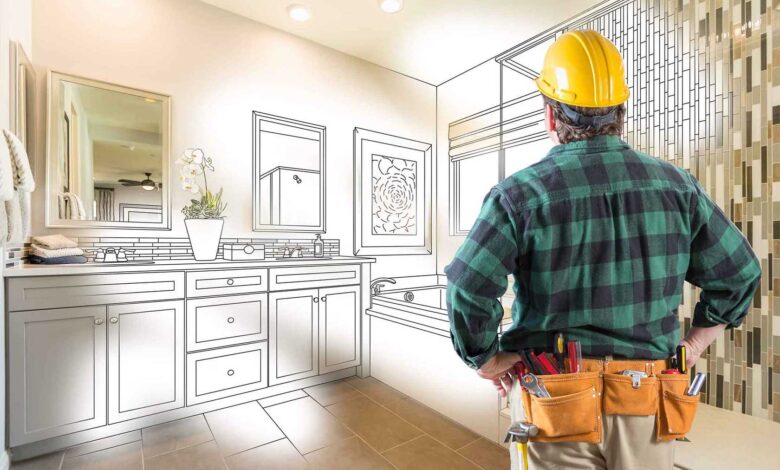The Ultimate Guide to Hiring and Becoming a Skilled Home Renovator

A home renovator is more than just someone who fixes old houses — they are visionaries who transform worn-out spaces into dream homes. Whether you’re looking to hire a home renovator or thinking about becoming one yourself, you’re in for an exciting journey. From patching up leaky ceilings to installing brand-new kitchens, these skilled professionals bring both homes and ideas to life.
In this guide, we’ll walk you through everything you need to know about home renovation. From finding the right person for the job to learning the ropes of the trade, we’ve got it all covered — plain and simple. Ready to dive in? Let’s roll up our sleeves and get started.
Who is a Home Renovator?
A home renovator is someone who improves homes by repairing, remodeling, or upgrading them. They might work alone or with a team, tackling everything from painting and flooring to major structural changes.
Home renovators can be:
- Independent contractors
- Part of renovation companies
- DIY experts turned professionals
- Specialists in certain tasks (like tiling or plumbing)
Their work helps increase property value, improve safety, and make spaces more enjoyable to live in. It’s hands-on, creative, and always in demand.
What Does a Home Renovator Do?
A home renovator wears many hats. Some days they’re knocking down walls; other days they’re planning kitchen layouts or installing light fixtures. Here are just a few things they handle:
- Planning and designing renovations
- Demolition of old structures or finishes
- Electrical and plumbing upgrades
- Flooring, painting, and drywall
- Cabinet and fixture installation
- Permits and building codes compliance
- Working with clients and managing budgets
Whether the project is big or small, their goal is to bring the homeowner’s vision to life while staying on time and within budget.
Why Hire a Professional Home Renovator?
Let’s face it — some home improvement tasks are better left to the pros. Sure, DIY videos can help with painting a wall or assembling furniture. But when it comes to things like rewiring or knocking out walls? That’s a whole different ball game.
Here’s why hiring a home renovator makes sense:
- Expertise: Years of experience help them avoid costly mistakes.
- Safety: They understand building codes and safety rules.
- Efficiency: Projects get done faster with fewer setbacks.
- Quality: Professionals deliver results that last for years.
- Stress-Free: You can sit back while they handle the hard stuff.
Essential Skills Every Home Renovator Needs
Not just anyone can pick up a hammer and call themselves a renovator. It takes a unique mix of skills to be successful in this field. Whether you’re hiring or becoming one, look for or develop these qualities:
Technical Skills
- Carpentry
- Plumbing and electrical basics
- Drywall installation
- Tiling and flooring
- Painting and finishing
Soft Skills
- Problem-solving
- Communication
- Time management
- Creativity
- Attention to detail
Business Skills
- Budgeting
- Scheduling
- Negotiating with suppliers
- Understanding permits and codes
It’s this blend of know-how and people skills that sets great renovators apart from the rest.
How to Become a Home Renovator
Dreaming of working with your hands, fixing homes, and being your own boss someday? Here’s your road map to becoming a top-notch home renovator:
Step-by-Step Guide
- Get a High School Diploma
Most jobs require at least this level of education. - Learn Through Training or Apprenticeship
Work under experienced contractors or enroll in trade schools. - Get Licensed or Certified
Depending on where you live, you might need a license to work legally. - Gain Experience
Start small. Offer to renovate friends’ places or work on your own home. - Build a Portfolio
Before-and-after photos go a long way in showing your skills. - Start Your Own Business (Optional)
Once confident, launch your own home renovation service.
Common Home Renovation Projects
So, what kind of projects does a home renovator usually take on? Here’s a handy table that breaks it down:
| Project Type | Description | Time Frame | Complexity |
| Kitchen Remodeling | Cabinets, counters, sinks, lighting | 2–6 weeks | High |
| Bathroom Upgrades | New tiles, vanity, shower, or toilet | 1–4 weeks | Medium |
| Basement Finishing | Insulation, drywall, flooring, lighting | 4–8 weeks | High |
| Flooring Replacement | Tile, laminate, hardwood, or carpet | 1–2 weeks | Medium |
| Painting | Interior or exterior paint jobs | 3–10 days | Low |
| Roofing | Repairs or full roof replacements | 1–2 weeks | High |
Each project varies in time and complexity, depending on the home’s condition and the homeowner’s needs.
Tips for Choosing the Right Home Renovator
The difference between a successful renovation and a disaster often lies in who you hire. So, how do you pick the right home renovator?
Here’s what to look for:
- Verified license and insurance
- Strong reviews and references
- Experience in your type of project
- Clear, honest communication
- Detailed written estimate
- Realistic timelines
Red Flags:
- Vague contracts
- Requests for full payment upfront
- Poor communication
- No references or license
A trustworthy renovator won’t mind answering your questions or showing you proof of their work. If it feels sketchy — walk away.
Tools of the Trade: What Does a Home Renovator Use?
Every home renovator needs a solid set of tools to get the job done right. Some tools are basic, while others are high-tech or specialized.
Must-Have Tools:
- Hammer and nails
- Measuring tape and level
- Power drill and bits
- Saw (circular, jig, or table)
- Screwdrivers and pliers
- Safety gear (goggles, gloves, masks)
Advanced Tools:
- Laser levels
- Nail guns
- Wet tile saws
- Stud finders
- Inspection cameras
Good tools make the work easier, faster, and more precise — a key reason experienced home renovators can work magic on homes.
Budgeting for a Renovation
Let’s talk money. One of the biggest questions homeowners ask a home renovator is: “How much will this cost?”
The answer? It depends — but you can manage costs with smart planning.
Budgeting Tips:
- Set your goals: What’s a must-have vs. a nice-to-have?
- Get multiple estimates: Don’t go with the first quote.
- Include a cushion: Always budget 10–20% extra for surprises.
- Track expenses: Use apps or spreadsheets to stay organized.
- Plan in phases: Can’t afford it all now? Renovate in stages.
A good renovator will help you get the best bang for your buck, without cutting corners.
The Future of Home Renovation
The world of home renovation is always changing. New trends, eco-friendly materials, and smart home technology are shaping how homes are built and remodeled. So what does the future look like for a home renovator?
Rising Trends:
- Sustainable Materials: Bamboo floors, recycled wood, and energy-efficient windows.
- Smart Homes: Lights, thermostats, and security systems controlled by apps.
- Open Concepts: Fewer walls, more space, and natural light.
- Aging-in-Place Designs: Homes that grow with families and older residents.
- Minimalist Styles: Sleek designs with less clutter and more function.
Staying ahead of the curve is key for any renovator who wants to keep clients happy and homes future-ready.
Final Thoughts: Why a Home Renovator Matters
Whether you’re looking to refresh a single room or completely overhaul your house, a home renovator plays a crucial role. Their mix of skill, creativity, and experience turns plans into reality and houses into homes.
Hiring the right person or becoming one yourself can be one of the most rewarding decisions you’ll make. Just remember to ask the right questions, keep your goals clear, and plan wisely. With the right home renovator on your side — or the right mindset if you’re becoming one — there’s no limit to what you can achieve.





